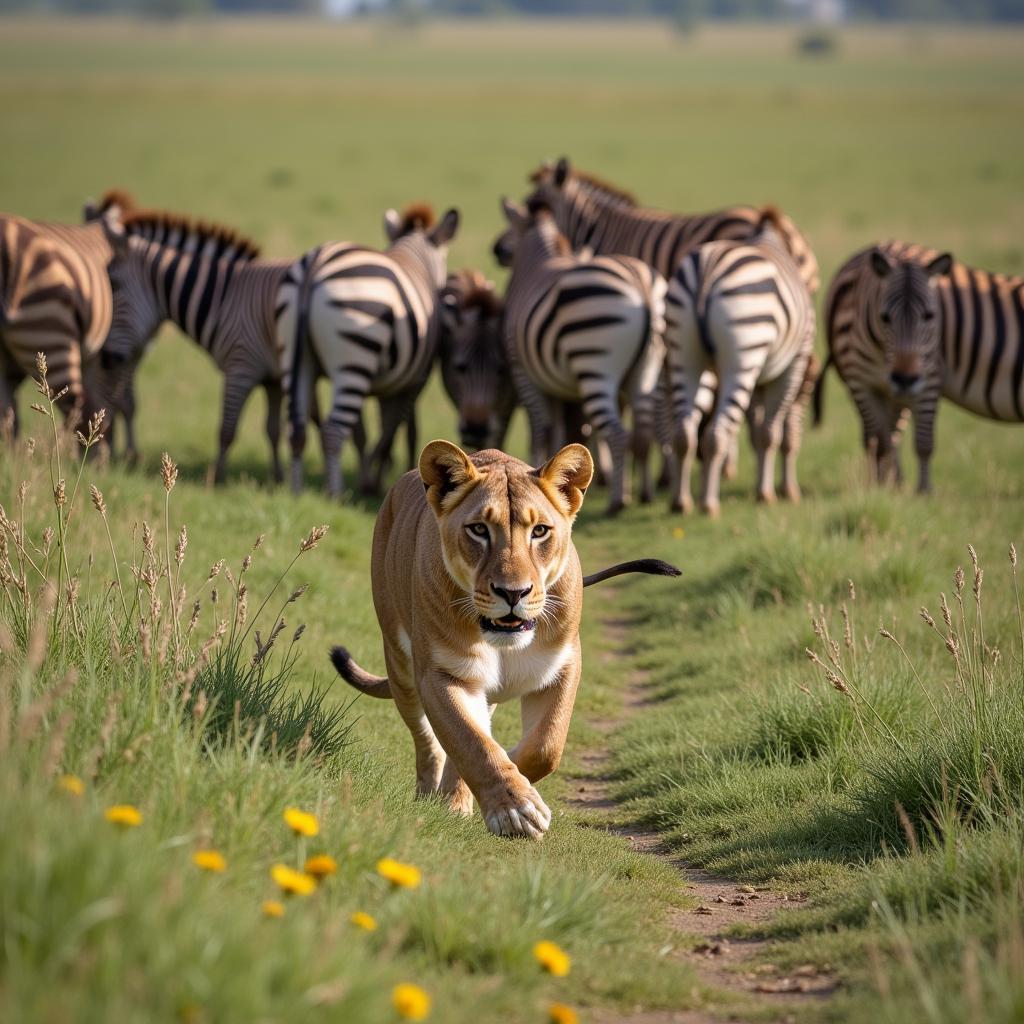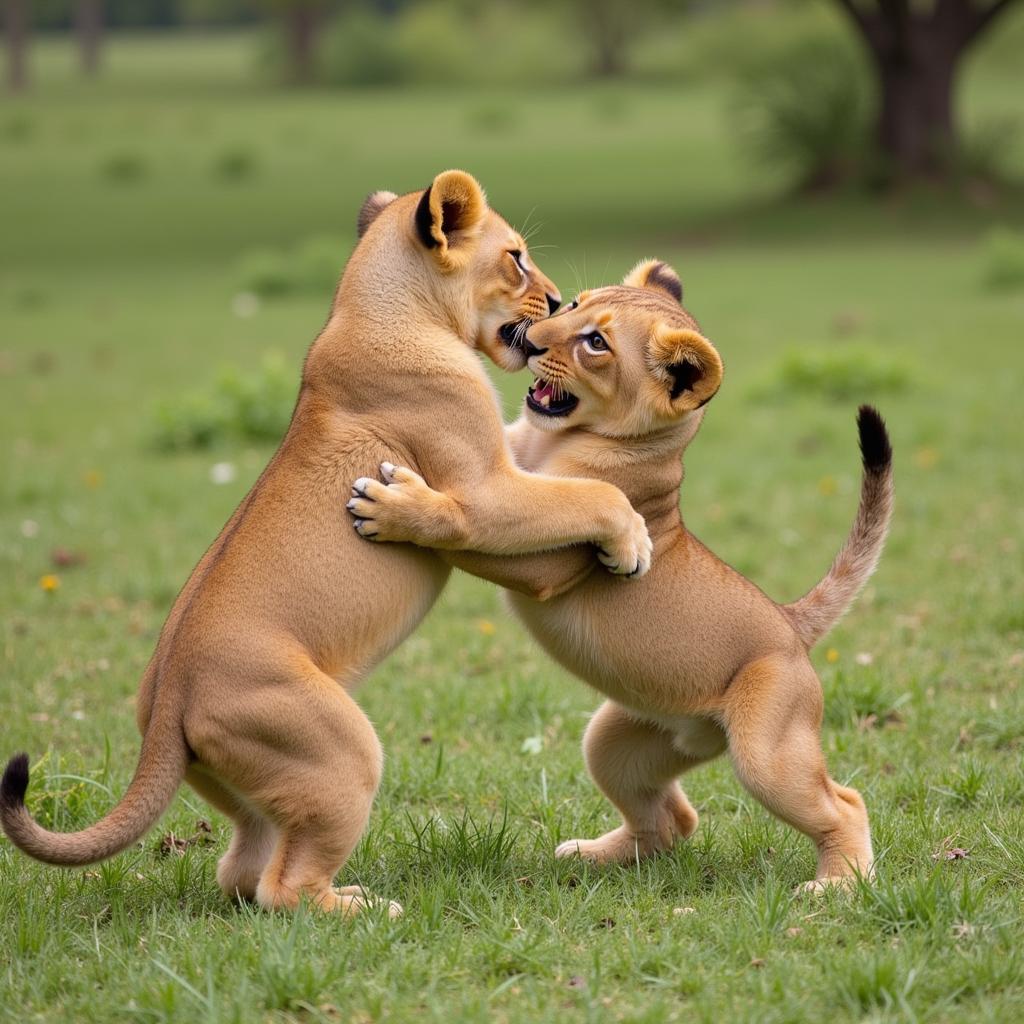The Majestic Animal of African Lion: King of the Savannah
The animal of African lion, often called the “king of the savannah,” is an iconic symbol of Africa’s wildlife. This majestic creature, with its powerful roar and regal presence, captivates the imagination and embodies the wild spirit of the continent. But there’s much more to these big cats than meets the eye. From their complex social structures to their crucial role in the ecosystem, lions are fascinating animals worthy of in-depth exploration. Let’s delve into the world of the African lion and uncover the secrets behind their enduring reign.
After a successful hunt, lions often rest in the shade, conserving energy for their next endeavor. See how they blend seamlessly into the african ecology. Their tawny coats provide excellent camouflage, allowing them to stalk prey undetected.
Understanding the Animal of African Lion: Social Dynamics and Behavior
Lions are the only truly social big cats, living in prides consisting of related females, their cubs, and a coalition of males. These prides can range in size from a few individuals to over thirty. The females, often sisters or cousins, cooperate in hunting and raising their young. The males, typically brothers or unrelated nomads, defend the pride’s territory against rivals. This intricate social structure is crucial for their survival, allowing them to effectively hunt large prey and protect their offspring.
The Lion’s Roar: Communication and Territory
The lion’s roar, a powerful vocalization that can be heard up to five miles away, serves multiple purposes. It’s used to communicate with other pride members, warn off intruders, and establish territorial boundaries. The deep, resonating sound is a testament to the lion’s strength and dominance.
The Hunt: Strategies and Prey
African lions are apex predators, playing a vital role in maintaining the balance of the African ecosystem. They primarily hunt large herbivores such as zebras, wildebeest, and buffalo, using a combination of stealth and cooperative hunting techniques. The females typically do the hunting, working together to ambush and bring down their prey. The males, although capable hunters, often focus on defending the territory and protecting the pride. The african grassland food chain highlights the lion’s position at the top.
Adaptability and Survival in a Changing World
Despite their status as apex predators, African lion populations face numerous threats, including habitat loss, human-wildlife conflict, and trophy hunting. Conservation efforts are crucial to ensure the long-term survival of these magnificent animals. Understanding their behavior, social dynamics, and ecological role is essential for developing effective conservation strategies. The african continent map sahara desert shows the vastness of their potential habitat, but also the fragmentation caused by human activity.
 African Lioness Hunting Zebra
African Lioness Hunting Zebra
What Does the Future Hold for the Animal of African Lion?
The future of the African lion depends on our collective efforts to protect their habitat and mitigate the threats they face. By supporting conservation initiatives, raising awareness, and promoting responsible tourism, we can help ensure that the “king of the savannah” continues to reign for generations to come. The speed and agility of an African cat is breathtaking. Explore more on african cats immage 2880 1800.
Dr. Anika Moti, a renowned wildlife biologist specializing in African lion conservation, emphasizes the importance of community involvement: “Local communities living alongside lions are key partners in conservation. Their knowledge and participation are crucial for ensuring the long-term success of conservation programs.”
Professor Charles Mbogo, a leading expert in African ecology, adds, “Protecting the lion’s habitat is not just about preserving a species; it’s about safeguarding the entire ecosystem. Lions play a vital role in maintaining biodiversity and the health of the savannah.”
 African Lion Cubs Playing
African Lion Cubs Playing
The graceful african gazelle springbok shares the savannah with the lion. Understanding the dynamics of these relationships is crucial to appreciating the complexity of the ecosystem.
In conclusion, the animal of African lion is a magnificent creature that holds a special place in the hearts of many. Their social complexity, hunting prowess, and ecological significance make them a truly remarkable species. By understanding and addressing the challenges they face, we can help ensure that these majestic animals continue to roam the African savannah for years to come.
FAQ
-
What is the average lifespan of an African lion? Wild lions typically live for 10-14 years, while those in captivity can live up to 20 years.
-
How much do African lions eat? Adult lions can consume up to 7kg of meat per day.
-
How many lions are left in the wild? Estimates suggest there are between 23,000 and 39,000 lions remaining in the wild.
-
What are the main threats to African lions? Habitat loss, human-wildlife conflict, and trophy hunting are the primary threats to lion populations.
-
How can I help protect African lions? Supporting conservation organizations, promoting responsible tourism, and raising awareness about the importance of lion conservation are all ways to contribute.
-
Are lions endangered? African lions are classified as vulnerable by the IUCN.
-
What is the social structure of a lion pride? A lion pride consists of related females, their cubs, and a coalition of males.
Common Scenarios and Questions
-
Scenario: You’re on safari and spot a lion pride in the distance. Question: What is the appropriate behavior for observing lions safely?
-
Scenario: You hear news about lion poaching. Question: How can I support anti-poaching efforts?
-
Scenario: You’re researching African wildlife for a school project. Question: What are some reliable sources for information about lion conservation?
Further Exploration
For more information about African wildlife, explore our articles on African ecology and the African grassland food chain. You can also learn about other fascinating creatures that share the savannah with lions, such as the African gazelle springbok.
If you need assistance with planning your African safari or want to learn more about supporting lion conservation efforts, please don’t hesitate to contact us.
Call us at: +255768904061
Email us at: [email protected]
Visit us at: Mbarali DC Mawindi, Kangaga, Tanzania
We have a 24/7 customer service team ready to assist you.

